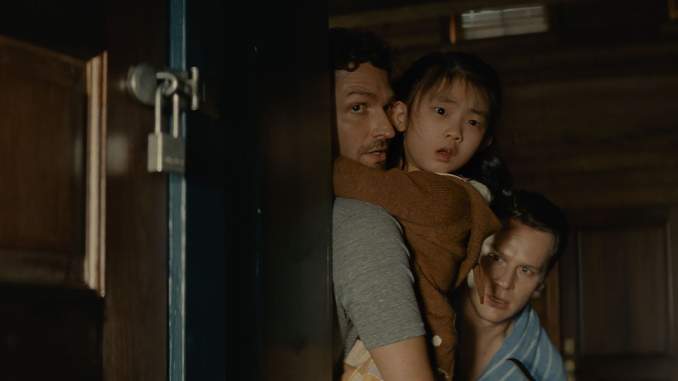Doomsday Thriller Knock at the Cabin Sees M. Night Shyamalan at the Top of His Game

Knock at the Cabin has a twist that audiences won’t see coming, if only because it defies what people have come to know about director M. Night Shyamalan. It’s a twist, but it isn’t, but it is, but it also isn’t. But in Knock at the Cabin—adapted from the novel The Cabin at the End of the World by Paul Tremblay—it’s less about the destination than the journey. Released a little under two years since Shyamalan’s previous film, Knock at the Cabin plays like an old dog who learned new tricks. It’s a sharper, more propulsive and formally exciting dramatic thriller that has far fewer disappointments in storytelling and visuals than 2021’s Old while revisiting and expanding upon familiar themes of family that Shyamalan has explored his entire career.
A film preoccupied with the frequent use of intimate, shot/reverse-shot close-up conversations, Knock at the Cabin opens with one between Leonard (Dave Bautista) and Wen (Kristen Cui—no Haley Joel Osment, but she’s mostly fine). Leonard bears Bautista’s imposing figure, but Bautista knows how to handle himself with a gentle touch. He’s soft-spoken and warm, and has a tenderness implicit in his presence akin to a large stuffed animal. It’s why Wen, a young girl of maybe seven or eight, is uncertain of the stranger—more than quadruple her size—approaching her in the woods who is asking to assist in her grasshopper hunt, but she is nevertheless disarmed by him. As Wen and Leonard talk genially to one another, the camera cuts between Bautista’s massive face straight-on at the camera and Wen’s, both of their heads cropped slightly outside of the constraints of the frame, but their connection remains within. It’s a connection that Leonard hopes will aid him and his associates in gaining access to Wen’s Airbnb cabin, where her two adoptive dads, Andrew (Ben Aldridge) and Eric (Jonathan Groff), are relaxing on the deck out back.
The strategy fails, but I suppose Leonard did try. Accompanied by two women, Adriane (Abby Quinn) and Sabrina (Nikki Amuka-Bird), and a hot-headed man named Redmond (Rupert Grint, whose first feature role in eight years proves he’s a force of nature), Leonard and his group forcibly enter the small family’s Airbnb. This results in a brief tussle that leaves Redmond with a busted nose and Eric with a severe concussion, one that puts Andrew at odds with his husband’s mental fortitude towards the group’s powers of persuasion. Once Eric and Andrew are tied up (Wen is too tiny to make restraint necessary), the group reveals the purpose of their presence. They were united by shared visions of a forthcoming apocalypse that will bring about the end of humanity, and the only way to stop it is if this particular family makes the choice to sacrifice one of themselves willingly. Thus, the doomsday group’s intent is to persuade the family of their cause, which reveals itself in the form of each member, in purposeful succession, allowing themselves to be beaten to death by the other members each time the family refuses their request. Every time one of them dies, a new plague will be unleashed on the planet.
It’s difficult to believe the doomsday group, and Eric and Andrew certainly don’t. Their excuses and disbelief come across as far more plausible than anything that the group is claiming, much of which can be explained away by various discrepancies, leaps in logic and the fact that they all come across as completely out of their minds. When the first member perishes at the hands of the others and a subsequent news bulletin reports on high magnitude earthquakes that have resulted in tsunamis and devastation, Andrew immediately clocks that the bulletin was not live—it was reported four hours ago. Furthermore, well, it’s just earthquakes; they aren’t uncommon, nor is the “resulting” disease that sees a spike in spread following the execution of the next group member (another pre-recorded news blast), but that Andrew recognizes was first identified months ago. In our world still plagued by an ongoing pandemic and by an ever-increasing number of climate change-induced natural catastrophes, neither of these events are out of the ordinary. That’s just life now.
Andrew goes on to put forth that the doomsayers show signs of “group delusion” stemming from their time converging on a message board, feeding one another’s fantasies and increasingly convincing themselves not only that what they’re saying is true, but that they’re all sharing the same visions.
-

-

-

-

-

-

-

-

-

-

-

-

-

-

-

-

-

-

-

-

-

-

-

-

-

-

-

-

-

-

-

-

-

-

-

-

-

-

-

-








































